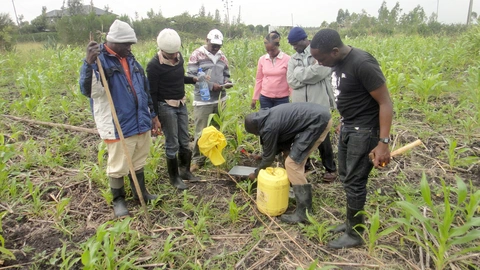Organic agriculture has the potential to improve both crop yields and incomes of smallholder farms in sub-Saharan Africa
September 02, 2021.
Christian Borgemeister co-author of collaborative study from the Research Institute of Organic Agriculture (FiBL)
References: Schader, C., Heidenreich, A., Kadzere, I., Egyir, I., Muriuki, A., Bandanaa, J., Clottey, J., Ndungu, J., Grovermann, C., Lazzarini, G., Blockeel, J., Borgemeister, C., Muller, A., Kabi, F., Fiaboe, K., Adamtey, N., Huber, B., Niggli, U., Stolze, M. (2021) How is organic farming performing agronomically and economically in sub-Saharan Africa? Global Environmental Change, 102325.
Organic agriculture has the potential to improve both crop yields and incomes of smallholder farms in sub-Saharan Africa substantially – this is shown in a unique collaborative study from the Research Institute of Organic Agriculture (FiBL) and its partners that has just been published in the renowned journal Global Environmental Change. This study further demonstrates that in real smallholder farm setting, this potential is difficult to exploit fully and requires sound implementation.
(Frick, 01.09.2021) In the past, the political and scientific discussion on organic farming was ideologically-driven as there was no or contradicting evidence about how productive and profitable organic agriculture is for smallholder farms. The now published study is ground breaking as it
- assesses different kinds of OA in SSA in different real farm settings.
- allows to analyse both at the success of different initiatives for introducing organic agriculture and the success of organic farming as a management system.
- has enough sample size (1645 farms), detailed data over a two-year time horizon and a scientifically sound comparison with a comparable conventional control group.
Therefore, for the first time this study clearly showed how different forms of organic agriculture performed in different real farm settings in SSA and to what extent they can contribute to sustainable development.
Organic agriculture has the potential to substantially boost productivity and farm incomes while substantially contributing to sustainable development in Africa if implemented well. But organic agriculture is certainly not a silver bullet for solving food security issues in SSA. Especially the implementation of organic agriculture in smallholder settings is complex and often fails.
It is necessary to distinguish between different forms of organic agriculture:
- Highly knowledge-intensive systems which are able to increase productivity and profitability and
- other forms which may just do not use conventional inputs (i.e. organic by default)
This will inform debates better and help to develop policies for supporting sustainable development of agriculture and food systems in SSA.
Download the paper
The open access version of the article How is organic farming performing agronomically and economically in sub-Saharan Africa? is now available online: https://authors.elsevier.com/sd/article/S0959-3780(21)00104-7
FiBL contacts
- Christian Schader, Group Lead Sustainability, FiBL Switzerland
Phone +41 62 865 04 16, e-mail christian.schader(at)fibl.org - Irene Kadzere, Scientist, FiBL Switzerland
Phone +41 62 865 72 76, e-mail irene.kadzere(at)fibl.org - Seraina Siragna, Head of Corporate Communications, FiBL Switzerland
Phone +41 62 865 63 90, e-mail seraina.siragna(at)fibl.org
Ghana contacts
Irene S. Egyir, Professor, Department of Agriculture Economic and Agribusiness, College of Basic and Applied Sciences, University of Ghana, Legon, Accra, Phone +233 240932768, e-mail ireneegyir(at)yahoo.com
Kenya contacts
Anne W. Muriuki, Centre Director, Kenya Agricultural & Livestock Research Organization (KALRO), Food Crops Research Centre, Kabete (NARL), Nairobi, Kenya, Phone +254 20 2464435, e-mail muriukianne(at)gmail.com
Links
https://www.sciencedirect.com/science/article/pii/S0959378021001047
Video
Short version: https://www.youtube.com/watch?v=H9t-1-OZHIA
Long version: https://www.youtube.com/watch?v=7JbfkXf4DKs
This media release online
This media release and pictures can be accessed online at www.fibl.org/en/info-centre/media.html.



